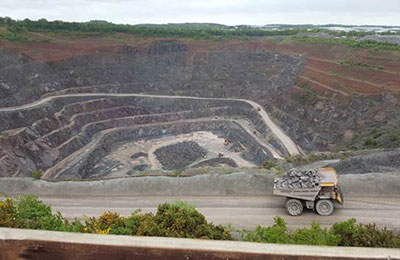
Last week, the ORR Highways team and I visited Aggregate Industries’ granite quarry at Bardon Hill in Leicestershire, just a stone’s throw away from the M1.
Under appropriately granite looking skies, we took a tour of the quarry site and then spent a couple of hours in roundtable discussion with the company’s senior UK management team on issues both local to the aggregates sector and strategic to the roads reform programme.
The existing Bardon Hill Quarry is perhaps best known for providing materials for the Olympic Park, Wembley Stadium and Silverstone. Its size is truly impressive: it’s the fifth largest quarry in the country, covering 74 acres and already 19 levels (200 metres) deep, with another five workable levels of stone to go.
Travelling north from London, Bardon Hill is the first hard rock you reach in England. So the quarries there will supply the roadstone (in the form of sub-base and asphalt, and concrete) for many of the road schemes that Highways England will be taking forward in the Road Investment Strategy. About a third of the stone will be delivered to site by rail.
The demand for stone from the quarries in the area highlights the pressures that the aggregates industry is under to meet the competing forward demands of major roads construction and other large infrastructure projects. For the transport sector alone that includes planning for conventional rail upgrades, HS2, Crossrail and future airport and ports expansion.
Forward visibility of demand is essential to the aggregates sector. This reinforces the value of the work we are doing with Highways England to ensure that the company’s capital programme of road schemes is planned and scheduled well in advance.
Aggregate Industries’ were keen however to impress on us the importance for the whole industry of having a predictable supply chain, and the challenges of having to cope with a ‘stop-start’ approach to decision making on major infrastructure schemes. This affects both road and rail (the company are a major supplier of ballast, for example, to Network Rail).
 With storage capacity for stone limited, logistics is key to the quarry’s smooth operation. This means getting the stone, which is crushed and graded on site, out to where customers want it as quickly as possible.
With storage capacity for stone limited, logistics is key to the quarry’s smooth operation. This means getting the stone, which is crushed and graded on site, out to where customers want it as quickly as possible.
It was good to hear that raw material suppliers also work closely with Highways England on delivery of these plans from an earlier stage than ever before, allowing supporting logistics infrastructure such as railheads close to major schemes to be developed. They are also thinking strategically about how they can support the smoothing of work volumes by bringing forward renewals, and taking pressure off the peak in road scheme starts in 2019/20.
The sector is also providing a rich source of innovation in its work with Highways England. Some of these practices focus on the environment – for example, deriving asphalt from recycled product.
Looking at opportunities for efficiencies and understanding how the supply chain can support Highways England’s delivery of its programme are at the heart of ORR’s role in monitoring Highways England’s performance.

